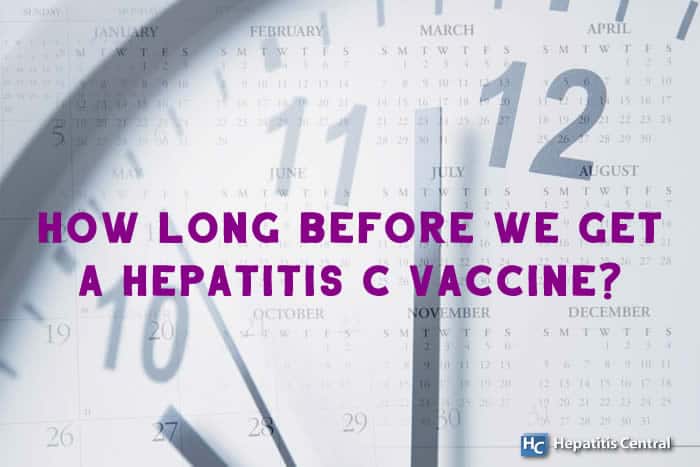How Long Before We Get A Hepatitis C Vaccine?


With over 71 million people infected globally with hepatitis C (HCV), clearly it is a prevalent public health problem and there is no vaccine currently available (1). We have been searching for over 25 years (2) for a vaccine for this disease, which was first identified in 1989, without any luck. Over 20 vaccines have been tested so far for Hepatitis C.
Barriers to Development of a Hepatitis C Vaccine
Barriers to development of an effective vaccine to HCV include:
- virus diversity
- limited models for testing vaccines
- and a lack of understanding of the protective immune responses involved in hepatitis C (3).
Diversity of the Hepatitis C Virus
The hepatitis C virus (HCV) has 7 genotypes and 80 subtypes making it one of the most diverse viruses on the planet. It exceeds the diversity of HIV. The multiformity of this virus makes it difficult to develop a vaccine with as wide a coverage as is warranted.
Limited Models for Testing Vaccines
It is difficult to get the HCV virus to replicate in non-human primates and it mutates too rapidly for a viable tissue culture. Culture strains of HCV incur adaptive mutations that increase replication efficiency with unknown effects on similar replications in the human body. Infection risks and practical production risks have limited their usefulness for study.
A small animal model for vaccine testing has been found in the rat that carries the hepaciviral, a virus like HCV. The closest model we have for study, however, is the chimpanzee but using a primate for this type of study poses ethical concerns.
Incomplete Understanding of Immune Responses
While we are learning from every failed trial of vaccine study, there is still a great deal we do not know about how HCV responds in immune situations. We have learned that a combined effort at targeting antibodies and T-cell immunity are both required for the best vaccine outcome for HCV.
Current Status of the HCV Vaccine
At the 26th International Symposium on Hepatitis C and Related Viruses held in Korea in October 2019 it was stated that there is currently no effective vaccine for HCV (1).
Reports of a failed study (1, 4) was presented by the keynote lecturer Andrea Cox who introduced the results from the first prophylactic HCV vaccine efficacy trial – a randomized, multicenter, double-blind, placebo-controlled study. The vaccine regimen was based on a viral vector consisting of a recombinant chimpanzee adenovirus 3 vector vaccine prime followed by a vaccine of a recombinant modified Ankara virus boost (1). They found that the vaccine protocol does not protect against chronic infection, although a blunting of the peak HCV RNA level was observed.
Furthermore, speaker Cox commented that many countries are not on track to eliminate HCV by 2030 and she emphasized the need to cure chronically infected hepatitis B and C patients or the mortality rates will be higher than those for HIV, tuberculosis and malaria combined by 2040.
GLS-6150: First Human Trial of an IFNL-3 HCV DNA Vaccine
The first ever human trial of an IFNL adjuvanted DNA based vaccine was recently published (5) highlighting its attributes in decreasing a population of immune destructive Treg cells in those individuals who were treated with direct acting antivirals (DAAs) and were re-infected. GLS-6150 is a vaccine designed specifically to prevent re-infection in those with sustained virologic response (SVR) from treatment with DAAs. If successful in this Phase I trial, it will be the first vaccine to afford protection against the HCV virus.
IFNL is a gene encoding for a specific set of cytokines related to interferon. A cytokine is an immune protein. Adjuvants may be added to a vaccine to boost the immune response and to minimize the dose of antibodies needed to initiate a longer lasting immune response.
HCV vaccines preventing re-infection of individuals previously treated with DAAs require special consideration because they exhibit unique immunological features including increased Treg cells. This new vaccine decreases Treg frequency. Treg cells inhibit immune response and work against what a vaccine is trying to accomplish. GLS-6150 reduces the size of the Treg population and can enhance virus specific T cell responses.
The study has moved on to its next phase after proving patient safety and efficacy in this phase.
Future Directions
Vaccine strategies designed to overcome the vast diversity of the HCV virus must generate a broad immune response and be capable of responding to many variations. Choosing antigens to maximize the induction of T-cell and antibody responses that elicit successful outcomes is an ongoing area of research.
New HCV vaccine approaches, including peptide, recombinant protein, DNA and vector-based vaccines have all recently reached Phase I/II human clinical trials. The challenge now is to move forth into testing larger at-risk or infected populations to truly test effectiveness. NIH continues its commitment to funding a vaccine with its announcement of a new grant vaccine opportunity on March 11, 2020 with applications due June 15, 2020. (6)
- Shin, E., Han, J.W., Kang, W., Kato, T., Kim, S. and Jang, S.K. (2020). The beginning of ending hepatitis C virus: A summary of the 26th international symposium on hepatitis C virus and related viruses. Viruses. 12(3): 302. Retrieved from https://doi.org/10.3390/v12030302
- Steckelberg, J. (n.d.) Why isn’t there a hepatitis C vaccine? Mayo Clinic. Retrieved 3/27/2020 from https://www.mayoclinic.org/diseases-conditions/hepatitis-c/expert-answers/hepatitis-c-vaccine/faq-20110002
- Bailey, J.R., Barnes, E. and Cox A.L. (2019). Approaches, progress and challenges to hepatitis C vaccine development. Gastroenterology, 156(2):418-430. Retrieved from doi: 10.1053/j.gastro.2018.08.060
- From NIH: Trial evaluating experimental hepatitis C vaccine concludes. (2019, June 9). HHS.gov. Retrieved 3/28/2020 from https://www.hhs.gov/hepatitis/blog/2019/06/05/experimental-hepatitis-c-vaccine-trial-concludes.html
- Han, J.W., Sung, P.S., Hong, S. H., Lee, H., Koh, J.Y., and Shin, E.C. (2020) IFNL3-adjuvanted HCV DNA vaccine reduces regulatory T-cell frequency and increases virus specific T-cell responses. Journal of Hepatology. Retrieved from https://doi.org/10.1016/j.jhep.2020.02.009
- NIH announces new grant opportunity for design of vaccines against hepatitis C virus. (2020, March 11). HHS.gov. Retrieved from https://www.hhs.gov/hepatitis/blog/2020/03/11/nih-announces-new-grant-opportunity-hcv-vaccine-design.html







